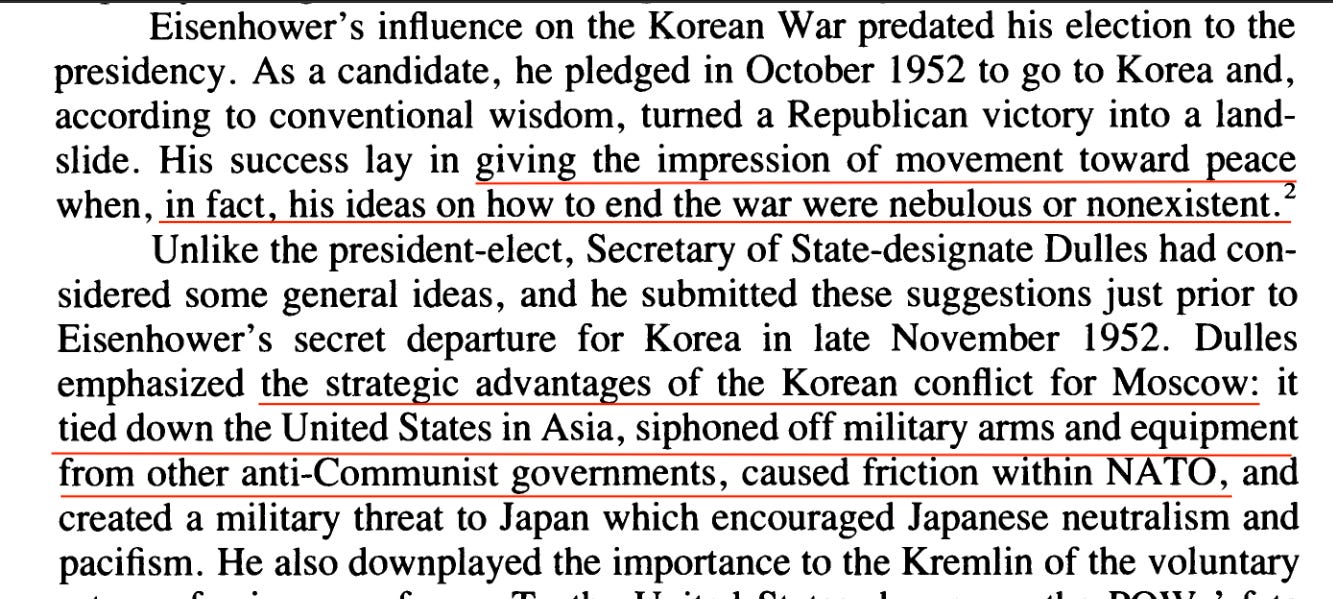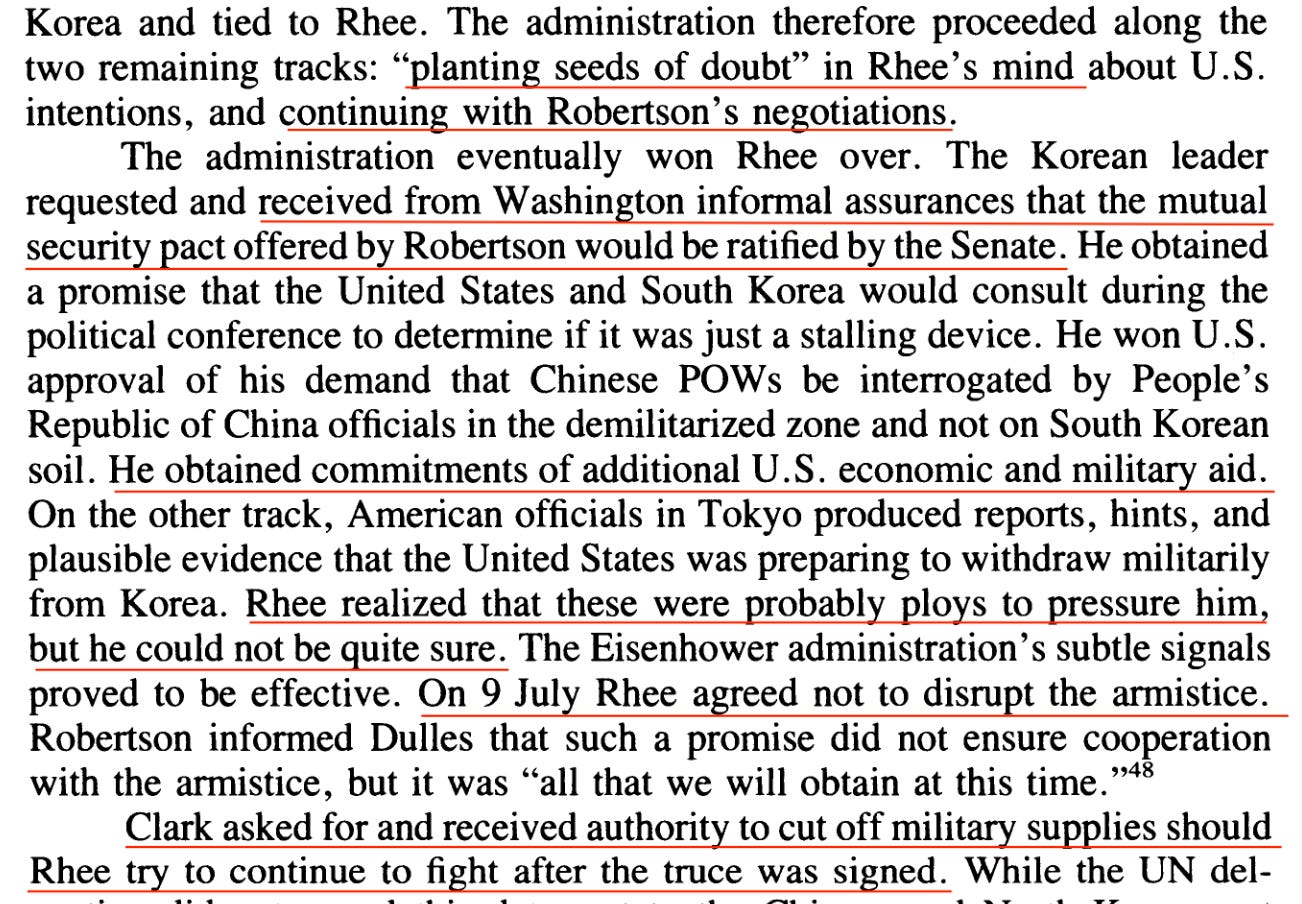An “immortal essay”
Last week I stumbled upon a gem of an essay. The best 23 pages on how Eisenhower ended the Korean War I’ve read. It was an obscure document I found in a footnote of an article reachable only on web.archive.org from 2006. The essay itself is from 1986.
I sent a screenshot to Professor Stephen Kotkin at Hoover – the world’s most eminent Soviet scholar – asking if he’d read it:
He shot right back:
“It’s an immortal essay in Diplomatic History – I rely on it extensively”
The essay states that Eisenhower was “thrashing about without a plan” four months in as newly elected Republican President (trying to end the three-year-long Korean War), having forcefully campaigned he’d be able to pull it off swiftly:

The parallels to Ukraine today, between Zelensky and President Rhee of South Korea, and between Trump and Eisenhower, are striking. Don’t believe me? Read just the first few highlights…
If you read my introduction line and the caption text, you get the juiciest bits.
1/ President Eisenhower “seriously underestimated Rhee’s [equivalent to Zelensky’s] opposition to the armistice”
2/ “The President was subject to fits of doubt, temper, and even despair that the Korean conflict could ever be resolved”

3/ A plan was non-existent, and the war continuing gave strategic advantage to Moscow (as it does arguably today to Beijing):

4/ The US was not prepared to start WWIII:
5/ “A World War I-style military stalemate… Eisenhower discounted the personal strength and tenacity of Rhee, an assessment that later would haunt him”
6/ “The ad hoc, even dilatory, manner in which his administration approached the problem once in office”

7/ Eisenhower really did consider using nukes. We have the Soviet Union to thank for the stigma created against their use:

The author of this essay, Edward C. Keefer, was a historian at the US State Department. This is not a Soviet/Russian account.
8/ How seriously the US considered using nuclear weapons:

The Secretary of State suggested that “the United States should try to destroy the ‘tabu’ surrounding the weapons”. (Thank God the voices of restraint prevailed.)
9/ President Eisenhower and his Secretary of State were not in alignment. Secretary of State Dulles was more hawkish than the President:

Can we imagine Secretary Rubio and President Trump having had a similar discussion?
10/ The armistice terms were so unfavourable to South Korea (as they surely will have to be to Ukraine) there was a sense of public outcry:

11/ The next passage (the one I sent to Professor Kotkin) needs to be digested slowly. There’s so much in it.
Setting it up:
US negotiators could not get the President of the country they were trying to help/save to go along with an armistice.
Three options were considered:
a) Arrest President Rhee
b) Abandon altogether
c) Give a security guarantee
Ultimately, only c) the security guarantee was presented to Eisenhower. With great internal reluctance (offering a US security guarantee meant “an open admission on our part that Rhee has the whip hand”), Eisenhower agreed.

I accept, in drawing this analogy, Zelensky today is not “the last obstacle” to peace. Russia’s recent actions have not exactly been conducive.
There are very severe downsides (for future Western credibility, and the potential of future nuclear escalation) to offering Ukraine a security guarantee. This should not be taken lightly. I’m here simply highlighting how Eisenhower managed the situation.
Professor Kotkin remarked in email, “I think the bilateral-plus [his suggested plan for a security guarantee] is now off the table, certainly for the time being – but we’ll see”.
12/ Rhee, on getting the promise of a security guarantee, still nearly undermined the entire peace process:

I think expect more such antics to come.
“A puzzled Eisenhower questioned Rhee’s apparent desire for national suicide” [as President Trump presumably has already of Zelensky]
“The United States might have no option but to withdraw from Korea”
Is this at all analogous with Ukraine’s attacks of the past week on Russia’s bombers – to the degree it enraged Putin?
13/ Eisenhower felt, in granting a security guarantee, he was “surrendering to Rhee’s blackmail”:

14/ To quit would have been political disaster:

Of course, today in Ukraine the US is not actively fighting (as it was in Korea, under the guise of the UN). Could withdrawal be any less politically disastrous to Trump? I might be wrong, but I personally don’t think so.
15/ “Rhee confided that [the US] was ‘like a hand to a drowning man’. The assistant secretary soon discovered, however, that for a drowning man Rhee could tread water very well. Rhee refused to compromise.”

Rhee’s old friends (Senators, Congressmen and former Ambassadors) sent him informal personal letters to “urge him to cooperate with the United States and not insist on fixed conditions”.
16/ The administration was trapped, and “tied to Rhee”:

“Eisenhower realized the dimensions of his dilemma… ‘We can do all sorts of things to suggest to Rhee that we might well be prepared to leave Korea, but the truth of the matter is, of course, that we could not actually leave. We must only take actions which imply the possibility of our leaving. Eisenhower was well aware that the United States was, in fact, trapped in Korea and tied to Rhee.”
Again, the US today doesn’t have its own troops in Ukraine. Is President Trump any less “tied to” Zelensky? I’m not so sure.
17/ “Planting seeds of doubt in Rhee’s mind… Rhee realized that these were probably ploys to pressure him, but he could not be quite sure.” [And President Trump is surely more unpredictable than Eisenhower.]

“Clark asked for and received authority to cut off military supplies should Rhee try to continue to fight after the truce was signed.”
18/ “Groping” for a strategy:

“The president worked from no master plan devised before inauguration. Like any new administration, Eisenhower groped for a strategy.”
For access to the full essay:
President Dwight D. Eisenhower and the End of the Korean War, Edward C. Keefer, 1986 (free after spending 30 seconds to make a JSTOR account)
An immortal essay, certainly.
All this to say:
History is really interesting. More statesmen should try and apply it.
The US has been here, roughly, before – four months into a new Republican administration.
A diplomatic outcome is, I believe, still possible – “groping for a strategy” and “thrashing about without a plan” though President Trump at times seems to be. He’s in heroic company.
Let’s hope the administration can channel Ike, stay resolved, and bring an armistice together.








